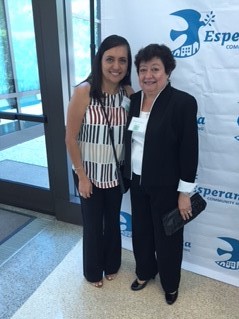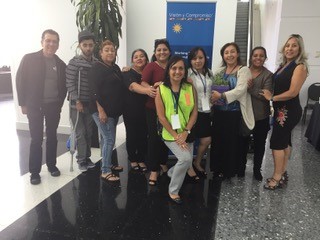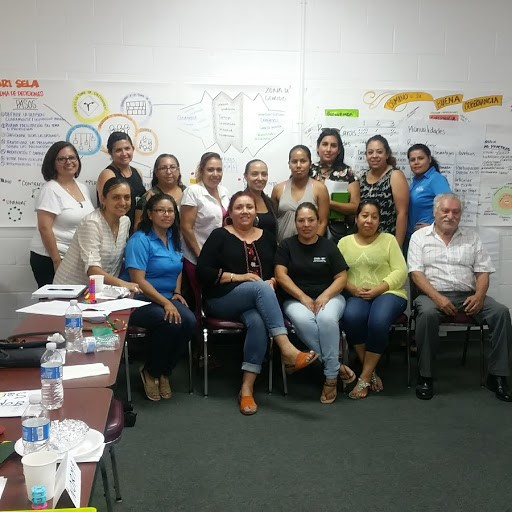Best Start is First 5 LA’s place-based initiative designed to improved results for children, families and communities. The initiative, which operates in 14 of Los Angeles’ most challenged communities, supports the development of local Community Partnerships made up of parents, residents, business and community leaders, health care providers, community service agencies, faith-based leaders, local government officials and interested community members who have made a commitment to working together to improve the conditions and opportunities that will ultimately improve results for children, families and the communities they live in. CSSP’s primary role with First 5 LA and the Best Start initiative is to help build the capacity of the 14 Community Partnerships so that they are high functioning, results focused entities that will continuously seek to improve community and family conditions for children for years to come.
With a team of approximately 20 members, the Los Angeles based CSSP team works directly with community partnership members, local organization and building organizations to ensure that the essential capacity building measures that have been the core of CSSP’s work overtime are the basis for each partnerships’ skill building and design.
___
¡Presente! Our Best Start parent and resident leaders yelled out “present” during the welcoming ceremony at the Visión y Compromiso’s 15th Annual Conference on October 6 & 7, 2017 at the Ontario Convention Center. The ballroom that held about 1,000 promotores and community leaders shook with energy and laughter. The conference welcomed members from local areas, across the nation and internationally. Our Best Start members connected with new contacts and participated in dozens of workshops. Opportunities, such as the conference, uplift the Best Start’s parent and resident leaders’ commitment to be a part of the process, create a sense of ownership and motivate them to become advocates for their communities.
The following is an interview with Lupe Gonzalez, a capacity builder for Southeast Los Angeles (SELA) and Wilmington about her experiences as a community leader, her path to become a capacity builder with Best Start, and getting the Visión y Compromiso Conference, a gathering of community health educators, off the ground. In 2017, most of the 14 Best Start communities sent 90 parent leaders to this three-day conference. For more information about Visión y Compromiso and the 2018 conference, its 16th annual slated for October 4-6, please visit http://www.vycconference.org/
 José Montaño: Lupe, tell us about how you started out and how you came to be a community leader and capacity builder?
José Montaño: Lupe, tell us about how you started out and how you came to be a community leader and capacity builder?
Lupe González: I was born and raised in South LA, and the negative part (of growing up there) was that youth were not seen as being capable of graduating high school. Luckily there was a model that came into South LA, which was the promotor (community health educator) model. It offered community members the opportunity to be a part of the training. The model cultivated the experiences that people had and launch it into community education and organizing. The Esperanza Community Housing Corporation provided the first-cohort training for South LA members in the late 90s. The director back then went to ESL classes in the neighborhood and schools, and the application came to my house. My dad took ESL classes and brought it back for my mother. We (my mother and I) both applied and got in.
The model opened up a trust-based relationship. I saw how it helped our family to develop better communication. The model helped me, my mother, and my family. What could it do for the community?
JM: How did you go from being a local leader in South LA to helping establish a national effort and conference like the one at Visión y Compromiso?
LG: At first, it was just Esperanza graduates, then we started learning we had “cousins” in like-minded organizations, such as Planned Parenthood. We all thought we were the only promotor group that existed. We weren’t, there were a lot of us. We connected and talked together. We identified the need for the types of support, and because we didn’t have the structure to do it, we didn’t have an organization.
Leaders from the promotor groups saw an opportunity to keep supporting us and to create a nonprofit organization. We didn’t give it a name until a collective gathered, we got together at a conference about 90 of us, a lot of promotoras from different places, and we identified the needs and the support we desired. We started throwing out names and it became Visión y Compromiso. Visión because we had a vision and wanted to become liaisons, a bridge, employees, better people in our communities, anything we wanted; and compromiso because we needed to be committed.
 JM: Tell us a little about your how you went from being a promotora to becoming a nonprofit leader training promotoras?
JM: Tell us a little about your how you went from being a promotora to becoming a nonprofit leader training promotoras?
LG: Through my volunteer work with Esperanza, I became a part of the staff. I took on the role of the Director of Health Programs. I saw how grants functioned, how to supervise promotores, and how to run programs.
Originally, I was trained in 1996, we graduated in December 1996, and in 1997, we wanted to go out and change the world. Each year after that Esperanza graduated more promotores. I became a mentor to many new promotores. In 1998, I officially became an employee with a program under California Hospital to teach community members about the Medi-Cal managed care system.
JM: How about your role with Visión y Compromiso? You’ve been involved from the very beginning. How has your role evolved from organizer, co-founder of the conference to now what?
LG: I wouldn’t say too much co-founder. That came from a lot of us. We were in different spaces, and we started by saying things like, “My name is Lupe and I’m a promotora de salud (community health educator/promoter).” And then people would ask, “What is that?” and that’s where we started gaining traction, validity, and acknowledgement.
This year is the 16th Annual Conference. The way that my role has evolved is similar to the way I became a promotora, I started participating as a volunteer and became passionate about the work that they do.
 JM: Lupe, you shared much about your history of leadership and how you helped shape Visión y Compromiso and Best Start’s involvement in that. Can you share with us how you came to be a capacity builder?
JM: Lupe, you shared much about your history of leadership and how you helped shape Visión y Compromiso and Best Start’s involvement in that. Can you share with us how you came to be a capacity builder?
LG: My journey as a capacity builder began four years ago when I was a part of the Best Start Metro Community Guidance Body. I learned about Best Start when I was a resident in the area and also through my work at Esperanza Community Housing Corporation. While at Esperanza, I was working with the promotor training and participating in both efforts I came to understand that the two organizations had things in common. There (at Best Start Metro), I met Brenda Aguilera and Aja Howell who introduced me to the capacity building opportunities through training and practice.
I was introduced to the communities of SELA and Wilmington, and with the support and trust of the communities, the organizations and First LA staff, I eventually became the facilitator for those communities. When the facilitator contract came to an end, I was invited to be a part of the capacity building team
JM: What are you most proud of with this conference and professionally? What is your greatest accomplishments to date?
LG: Professionally, one of the biggest accomplishments is being a capacity builder with CSSP. To be a promotora and be within a team of people with such varied educational levels and life backgrounds. Wow! By being part of Best Start Metro LA… and now being a mentor to those community members that are following in my footsteps, that’s a great accomplishment for me personally.
Because of the work that we have done together, the promotores has become a nationally recognized model. I was invited to become a member of the national steering committee of promotores in Washington DC. I’m really proud to represent the promotores en la lucha (in the struggle.) Many don’t have the income to go to meetings, or they don’t have the means of transportation, but they are still there. It’s their movement, they have a sense of ownership, so that makes me very proud.
I have also learned a lot through my years in Best Start. Starting off as a member of Best Start gave me the background and context to be able to guide communities as they planned for the future. There have been wins and lessons learned. The promotor training I received early on helped set the foundation and the Best Start trainings reinforced my confidence. I have been fortunate to share my story with the Best Start members and hope that it motivates them to continue developing what they already have, to be the best they can be to support their own communities.
JM: Congratulations, Lupe!
LG: Thank you.
—
Lupe González is a CSSP Capacity Builder, Wilmington and SELA and José Montaño is a CSSP Capacity Builder, East LA